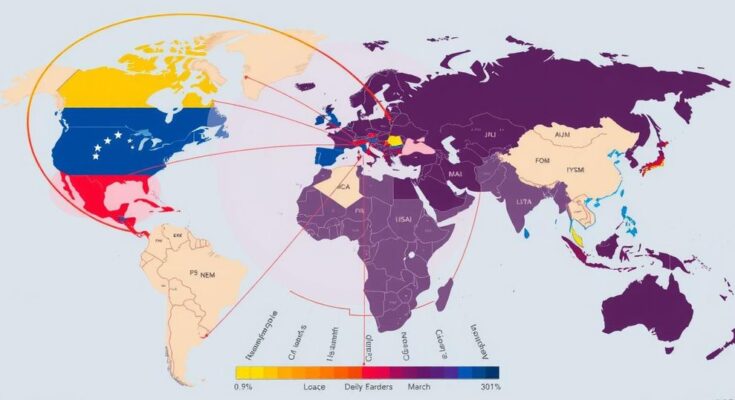Nicolás Maduro’s inauguration for a third presidential term has provoked widespread accusations of electoral fraud favoring his opponent, Edmundo González. Latin American leaders reject Maduro’s claims, while analysts stress the significance of internal tensions within his regime and an urgent need for the opposition to unify. The efficacy of new U.S. sanctions is called into question, with experts advocating for a stronger focus on supporting Venezuelan democratic aspirations amidst a deteriorating political landscape.
On January 5, 2025, Nicolás Maduro was inaugurated for a third term as Venezuela’s president, despite credible allegations of electoral fraud favoring his opponent, Edmundo González. The opposition claims that González received more votes than Maduro in the widely criticized election. In response, Maduro’s regime escalated its crackdown on dissent, exemplified by the temporary detention of opposition leader María Corina Machado prior to the inauguration. The geopolitical landscape further complicates the situation as the Biden administration imposed new sanctions against Venezuelan officials, while leaders across Latin America express their rejection of Maduro’s authority. Experts from the Atlantic Council highlight the internal divisions within the Maduro administration and the importance of a united opposition moving forward.
The Atlantic Council experts analyzed the implications of Maduro’s illegitimate inauguration and its effects on Venezuela’s political future. Jason Marczak emphasized the unusual unity among diverse Latin American leaders against Maduro, while Geoff Ramsey noted the internal tensions within the regime. Iria Puyosa remarked that the sanctions imposed by the United States were inadequate to compel Maduro’s removal, and Lucie Kneip emphasized the necessity for the opposition to establish a unified strategy in the face of governmental repression. Lastly, William Tobin discussed the precarious situation of Venezuela’s oil sector and the need for a comprehensive approach to sanctions that also considers support for the Venezuelan people.
In recent years, Venezuela has experienced extreme political turmoil, characterized by an ongoing struggle between the Maduro government and various opposition factions. The legitimacy of Maduro’s presidency has been widely challenged, notably following the elections held in July 2024, which many view as fraudulent. This lack of legitimacy has led to increasing friction not only within Venezuela but also with the international community. The Biden administration’s reactions, including sanctions aimed at diminishing Maduro’s power, alongside the unprecedented consensus among regional leaders against his regime, reflect the complex geopolitical dynamics at play in Latin America today.
In conclusion, Maduro’s assumption of power for a third term underscores the grim reality of Venezuela’s political climate, marked by a lack of legitimate governance and widespread repression. The international response, particularly from the United States and regional leaders, aims to fortify the resistance against Maduro while offering support to the opposition. It is crucial for the opposition to unify around a coherent strategy to challenge the government effectively, as internal divisions can potentially undermine their efforts. The road ahead remains fraught with challenges, yet collective action and diplomatic efforts may provide the foundation necessary for political change in Venezuela.
Original Source: www.atlanticcouncil.org




